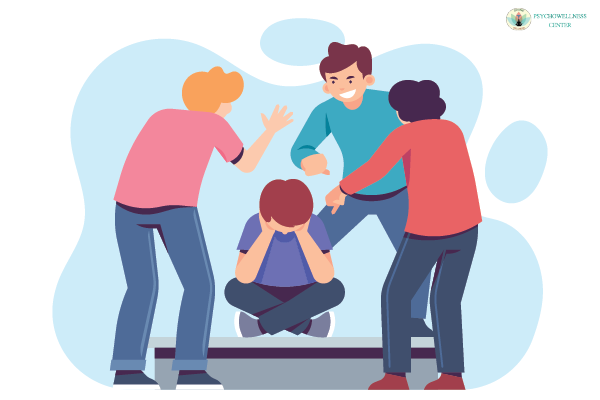In the interconnected world of today, where social interactions transcend physical boundaries, bullying has evolved into a pervasive issue that affects individuals of all ages, backgrounds, and walks of life. From playgrounds to social media platforms, the specter of bullying lurks, leaving a trail of emotional scars and shattered self-esteem in its wake. As we embark on this journey of awareness and understanding, it is imperative to recognize the signs of bullying, empower individuals to speak out and cultivate a culture of empathy and respect.
Unraveling the Complexities of Bullying
Bullying is not simply a matter of teasing or harmless banter; it is a systematic abuse of power that inflicts emotional, psychological, and sometimes physical harm on the victim. Understanding the various forms and manifestations of bullying is crucial for effective intervention and support.
Types of Bullying:
-
Physical Bullying: This form of bullying involves physical aggression or violence, such as hitting, pushing, or tripping the victim. It often occurs in settings where there is limited supervision, such as schoolyards or playgrounds.
-
Verbal Bullying: Verbal bullying encompasses insults, name-calling, taunts, and threats directed at the victim. It can occur in person, over the phone, or online, through platforms such as social media or messaging apps.
-
Social Bullying: Also known as relational aggression, social bullying involves manipulating relationships, spreading rumors, excluding the victim from social activities, or ostracizing them from peer groups.
-
Cyberbullying: In the digital age, cyberbullying has emerged as a prevalent form of harassment, involving the use of electronic devices and online platforms to intimidate, humiliate, or threaten the victim.
Recognizing the Signs of Bullying
Bullying often occurs in the shadows, away from the watchful eyes of authority figures, making it challenging to detect. However, by being vigilant and attuned to the subtle signs, we can identify individuals who may be experiencing bullying and offer them the support they need.
Common Signs of Bullying:
-
Emotional Distress: Victims of bullying may exhibit signs of emotional distress, such as Anxiety, Depression, irritability, or mood swings. They may become withdrawn or exhibit changes in behavior, such as reluctance to attend school or social gatherings.
-
Academic Decline: The effects of bullying on a victim’s attendance and academic achievement can be profound. They may experience difficulty concentrating, completing assignments, or participating in class activities due to fear or anxiety.
-
Social Isolation: Victims of bullying may become socially isolated, withdrawing from peer interactions and activities they once enjoyed. They may exhibit signs of low self-esteem, loneliness, or a reluctance to engage in social situations.
Empowering Individuals to Speak Out
Accessing support through Therapist near in delhi has revolutionized the way individuals cope with and understand bullying. This modern approach provides a safe, confidential environment where victims of bullying can openly discuss their experiences and receive professional guidance.
Strategies for Empowerment:
-
Open Dialogue: Encourage families, schools, and communities to have frank discussions about bullying. Encourage individuals to share their experiences and express their concerns without fear of stigma or shame.
-
Promote Empathy and Respect: Cultivate a culture of empathy, kindness, and respect where differences are celebrated, and bullying is not tolerated. Encourage bystanders to speak up and intervene when they witness bullying behavior.
-
Access to Support Services: Ensure that victims of bullying have access to support services, including online counseling, therapy, and crisis intervention. Provide information about helplines, online counseling platforms, and community resources where individuals can seek help confidentially.
How Counseling Psychologists Can Help:
-
Trauma-Informed Care: Counseling psychologists offer trauma-informed therapy tailored to the unique needs of each individual, helping them process their experiences, manage Symptoms of trauma, and develop coping strategies for resilience.
-
Self-Esteem Building: Through counseling and psychotherapy, psychologists help victims of bullying rebuild their self-esteem, challenge negative beliefs about themselves, and cultivate a positive self-image grounded in self-compassion and self-acceptance.
-
Skill-Building: Counseling psychologists teach practical skills and coping mechanisms to help individuals manage Stress, regulate emotions, and assert boundaries in their relationships. This equips them with the tools they need to navigate future challenges with confidence and resilience.
Searching for a “Psychologists near me” can connect individuals with local support systems essential for tackling bullying. Local therapists offer a personalized touch, understanding the specific cultural and social contexts of their clients.
Conclusion:
As we draw this exploration of bullying awareness to a close, let us reaffirm our commitment to creating a world where kindness triumphs over cruelty, empathy eclipses apathy, and every individual is treated with dignity and respect. By recognizing the signs of bullying, empowering individuals to speak out, and harnessing the expertise of the Top psychologists in delhi and mental health professionals, we can build a future for future generations that is happier and more compassionate.
Additionally, you may schedule an appointment with the top professional psychologists and receive Mental health counseling at the Psychowellness Centre, which has many locations in Delhi NCR, NOIDA, Faridabad, Janakpuri, Dwarka, and Vasant Vihar.
Contribution: Dr (Prof) R K Suri, Clinical Psychologist, life coach & mentor TalktoAngel & MS. Sulochna Arora, Psychologist.

